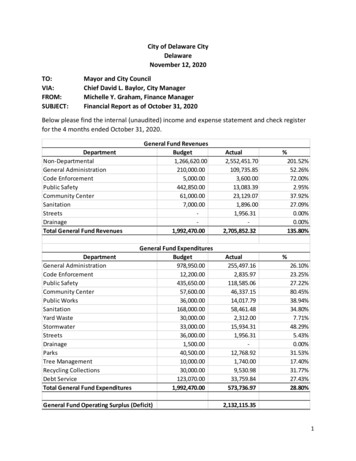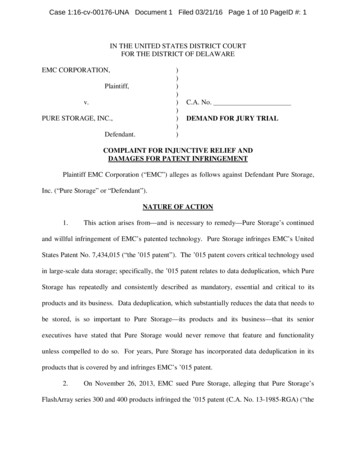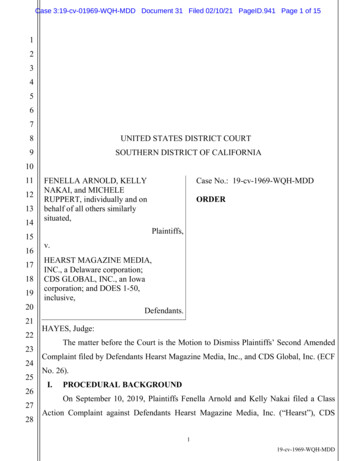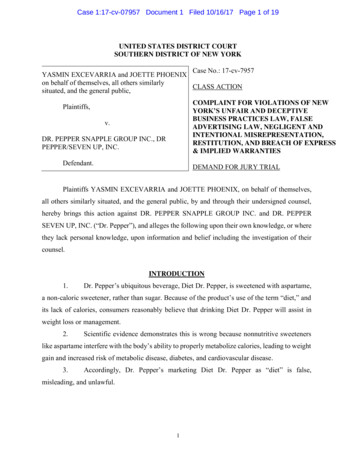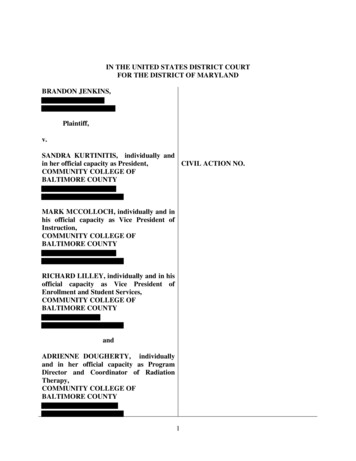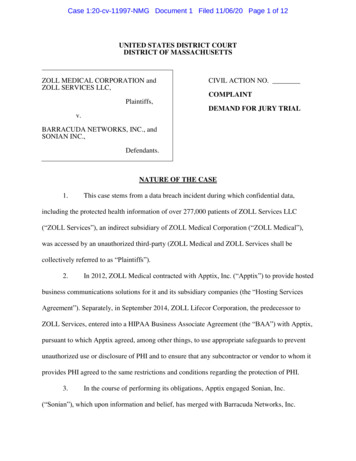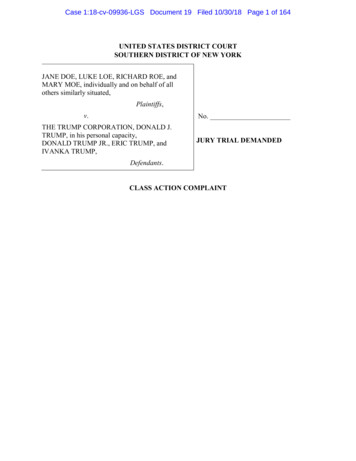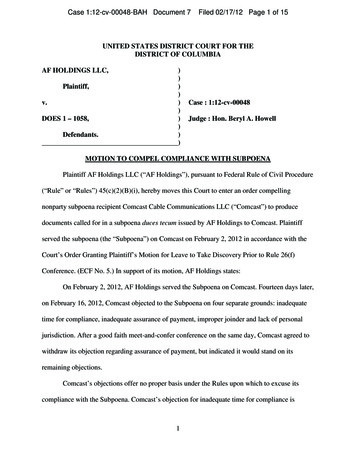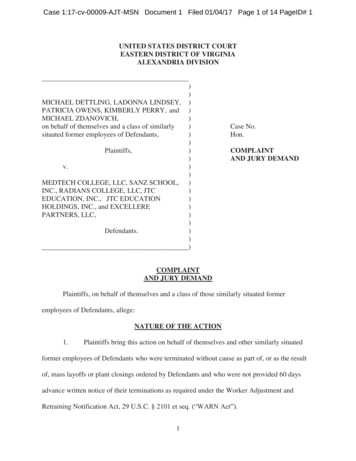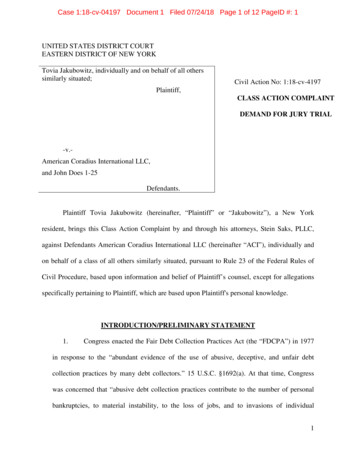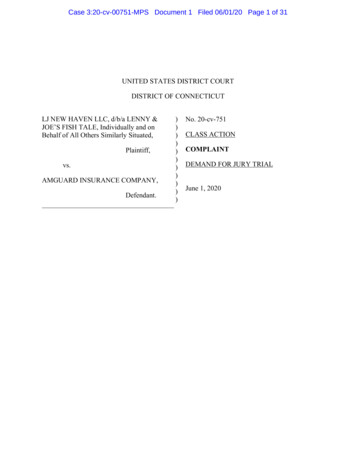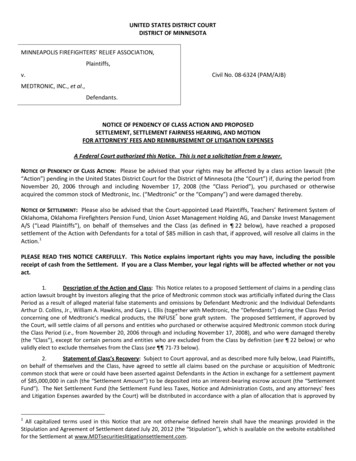
Transcription
In re: Bestwall, LLCDoc. 29IN THE UNITED STATES DISTRICT COURTFOR THE DISTRICT OF DELAWAREIN RE BESTWALL LLC,: Underlying Case No.: 17-BK-31795 (LTB)Debtor.: (U.S. Bankruptcy Court for the: Western District of North Carolina):: Misc. No. 21-141 (CFC)Beth Moskow-Schnoll, Ballard Spahr LLP, Wilmington, DE.Counsel for Armstrong World Industries, Inc. Asbestos Personal InjurySettlement Trust; Celotex Asbestos Settlement Trust; Flintkote AsbestosTrust; Pittsburgh Corning Corporation Personal Injury Settlement Trust;WRG Asbestos PI Trust; Federal-Mogul Asbestos Personal Injury Trust;Babcock & Wilcox Company Asbestos PI Trust; United States GypsumAsbestos Personal Injury Settlement Trust; and Owens Corning /Fibreboard Asbestos Personal Injury Trust.Chad S.C. Stover, Barnes & Thornburg LLP, Wilmington, DE; Garland S.Cassada, Stuart L. Pratt, Robinson, Bradshaw & Hinson, P.A., Charlotte, NC.Counsel for Bestwall LLCMEMORANDUMJune 1, 2021Wilmington, DelawareDockets.Justia.com
CONNOLLY, UNITED STATES DISTRICT JUDGEI.INTRODUCTIONBefore the Court is the Motion of Third Party Asbestos Trusts to Quash orModify Subpoenas (D.I. 1) (“Motion to Quash”), filed by nine asbestos settlementtrusts identified below (the “Trusts”), seeking an order quashing or modifyingsubpoenas to produce electronically stored claimant information which have beenserved upon them and the Delaware Claims Processing Facility (the “DCPF”) byBestwall LLC, a debtor in a chapter 11 case currently pending in the United StatesBankruptcy Court for the Western District of North Carolina (“NC BankruptcyCourt”). Several joinders to the relief requested in the Motion to Quash were filedby affected claimants (D.I. 3, 17, 20, 28) (“Additional Motions to Quash”). Alsobefore the Court are (i) Bestwall LLC’s Motion to Transfer Proceedings (D.I. 4)(“Motion to Transfer”), and (ii) Bestwall LLC’s Supplemental Motion to TransferProceedings (D.I. 23) (“Supplemental Motion to Transfer”), which together seekorders transferring all of the Motions to Quash to the NC Bankruptcy Court.For the reasons set forth herein, the Motion to Transfer and SupplementalMotion to Transfer are denied, and the Motions to Quash are granted withoutprejudice to Bestwall’s right to reissue the subpoenas seeking a narrower documentproduction that is consistent with the protections set forth in the order previouslyissued by the United States Bankruptcy Court for the District of Delaware (“DE
Bankruptcy Court”) and affirmed by this Court and the United States Court ofAppeals for the Third Circuit.II.BACKGROUNDA.The Trusts 1Each of the Trusts was established by one or more corporate debtors-inpossession to assume those debtors’ present and future liability for asbestos-relatedpersonal injury claims, as a prerequisite to having a United States District Courtissue an asbestos claims channeling injunction pursuant to 11 U.S.C. § 524(g) tosupplement the terms of the confirmation order in the debtor’s bankruptcy case.The Trusts are not corporate defendants or insurance companies. They are limitedfunds whose sole purpose is to pay victims of asbestos-related diseases caused bythe products of the debtors.The Trust Agreements establishing each of the Trusts require that theTrustees administer, maintain, and operate the Trusts pursuant to certain written1The ten Trusts are:The Armstrong World Industries, Inc. Asbestos Personal Injury Settlement Trust;The Celotex Asbestos Settlement Trust;The DII Industries, LLC Asbestos PI Trust;The Flintkote Asbestos Trust;The Pittsburgh Corning Corporation Personal Injury Settlement Trust;The WRG Asbestos PI Trust;The Federal-Mogul Asbestos Personal Injury Trust;The Babcock & Wilcox Company Asbestos PI Trust;The United States Gypsum Asbestos Personal Injury Settlement Trust; andThe Owens Corning / Fibreboard Asbestos Personal Injury Trust.2
Trust Distribution Procedures (the “TDP”), provisions of which – both the TrustAgreement and the TDP – were approved by a United States District Court andthereby incorporated into the debtor’s confirmed plan.Each TDP expressly provides that submissions to the Trust by the holders ofthe channeled asbestos claims (the “Trust Claimants”) (i) are intended to beconfidential, (ii) will be treated as made in the course of settlement discussionsbetween the claimant and the Trust, and (iii) are to be protected by all applicableprivileges, including those applicable to settlement discussions. (See, e.g., D.I. 11, Ex. A (Federal-Mogul Asbestos Injury Trust Distribution Procedures), § 6.5).Further, the TDPs of eight of the Trusts provide that the Trust shall “on its owninitiative” take steps to preserve such privileges. (Id.)B.The Bestwell Bankruptcy and the Rule 2004 MotionBestwall is the debtor in a pending chapter 11 bankruptcy case in the NCBankruptcy Court. Bestwell seeks evidence to support its contention that theBankruptcy Court should adopt a low estimation of the total value of its liabilityfor present and future asbestos personal injury claims.Bestwall endeavors to show that the evidentiary value of the amount it paidto settle approximately 15,000 pre-bankruptcy mesothelioma claims is taintedbecause a significant percentage of the roughly 15,000 claimants withheldinformation about other alleged asbestos exposure, which resulted in Bestwall3
overpaying for its share of such claimants’ damages. (D.I. 1, Ex. C (“Rule 2004Motion”), ¶¶ 2, 12).Accordingly, on July 31, 2020, Bestwall moved under Bankruptcy Rule2004 (the “2004 Motion”) for authority to issue a subpoena on the DCPF for theproduction of electronically stored data concerning any of Bestwall’s roughly15,000 settled mesothelioma claimants who also filed a claim against one or moreof the Trusts. Bestwall also sought authority to issue subpoenas on the Trusts, inthe event the DCPF was to assert that such are necessary to secure production. (Id.at 3-4). Bestwall served the 2004 Motion on the DCPF, but not on any of theTrusts.Thereafter, the DCPF filed a Response and Objection to the 2004 Motion,asserting, among other things, that (i) there is inherently sensitive information in itsdatabases that relate to Trust Claimants; (ii) the databases include personalidentifiers and medical information; and (iii) the improper dissemination of suchinformation could harm the Trust Claimants in a variety of ways, ranging fromidentity theft to misuse in the tort system by other defendants. (D.I. 1, Ex. D(“CPF Response and Objection”) at 16-23).The DCPF’s Response and Objection requested that the Court deny the 2004Motion. It also alternatively requested that, if the Court granted the 2004 Motion,the Court enter an order with a number of confidentiality protections and uselimitations, including:4
a.b.Limiting the production of Trust Claimants’ data to a random sampleof no more than 10% of the 15,000 mesothelioma victims at issue; andAuthorizing the DCPF, or a neutral third party, to anonymize theTrust Claimants’ claims data before producing it or, at minimum,requiring Bestwall and its experts to anonymize such data after it isproduced, and barring Bestwall from re-associating claimantpersonally identifiable information with the anonymized data.(Id. at 35-36). The DCPF’s request was consistent with its duty under its ClaimsProcessing Agreement with the Trusts to use its best efforts – when required todisclose confidential information – to ensure that such information will be treatedas confidential by all who receive it.On March 4, 2021, the Bankruptcy Court conducted a hearing during whichthe Judge concluded that Bestwall had met its burden of showing that theinformation sought is both relevant and necessary to the bankruptcy case, and thatthe 2004 Motion should be granted. The Bankruptcy Court also stated that itshared the DCPF’s concerns about the confidential, proprietary, and inherentlysensitive nature of the data that would be collected by Bestwall, and indicated thatthe 2004 Motion would be granted subject to certain conditions. (D.I. 1, Ex. E,3/4/21 Hr’g Tr. at 13:16-14:10).On March 24, 2021, the Bankruptcy Court entered an order granting the2004 Motion subject to certain provisions governing confidentiality. (D.I. 1, Ex.B, 5-24). The March 24 Order also authorized Bestwall to subpoena the Trusts ifnecessary to effectuate such order. However, the March 24 Order did not limit theprotection of data to a random sample of no more than 10% of the 15,000 claims at5
issue, nor did it authorize a neutral party to anonymize the Trust Claimants’ databefore production. Instead, it authorized Bates White, LLC – a firm whose datascience practice aggregates and analyzes data for use by its customers, and whichacts as Bestwall’s liability consultant – to anonymize the Trust Claimants’ data.The March 24 Order further requires the DCPF to identify a subset ofmatches to last names and social security numbers to Bates White by April 21,2021. The DCPF is to provide Bates White with the complete data pertaining tomatched claimants by May 28, 2021.Bestwall intends to have Bates White take the extraordinarily sensitiveclaims files from the DCPF that relate to up to 15,000 Trusts Claimants, which areseparately maintained by the Trusts, and pool them into a single database.C.The SubpoenasOn April 2 and April 5, 2021, pursuant to the March 24 Order, Bestwallserved the subpoenas on each of the Trusts, c/o the Delaware Claims ProcessingFacility (the “DCPF”) in Wilmington, Delaware or on DCPF’s counsel. (Seegenerally D.I. 1, Ex. B (aggregated subpoenas for the Trusts and DCPF)). Thesubpoenas compel the production of electronically stored confidential informationsubmitted to the Trusts by more than 15,000 of the Trust Claimants.Bestwall also served a subpoena for the Trust Claimants’ data on the DCPFon April 5, 2021. The Trusts have contracted with the DCPF to process the TrustClaimants’ claims according to the criteria and protocols of each Trust’s TDP. As6
such, the DCPF holds the Trusts’ data related to the claims made by the TrustClaimants. Although the DCPF holds the data of the Trusts, because ofconfidentiality requirements, the Trusts do not have access to each other’s datathrough the DCPF or otherwise.D.The Motion to QuashThe Trusts filed the Motion to Quash based on the confidentiality provisionsof the Trusts’ TDPs. These provisions make clear that the Trusts are not to serveas information clearinghouses or “public libraries” for entities that wish to obtainconfidential claimant information for their own commercial purposes. Rather,each Trust should take reasonable and necessary steps to protect the confidentialityof the information submitted to it by the Trust Claimants when that information issought by third parties for purposes other than determining whether the claimssubmitted to the Trust in question are valid and payable.Pursuant to the Court-approved confidentiality provisions of the TDPsrequiring the Trusts to take action to protect Trust Claimants’ confidentialinformation, the Trusts request that this Court quash each of the subpoenas servedon the Trusts and the DCPF by Bestwall. According to the Trusts, the highlysensitive, personal, and confidential nature of the information sought by Bestwall,as well as the unnecessary scale of disclosure sought, weigh decisively in favor ofquashing the subpoenas or modifying the sample size to be produced. The TrustClaimants’ submissions to the Trusts disclose medical records, sensitive personal7
health information, information about claimants’ personal finances, andinformation regarding claimants’ family members – all of which was disclosedwith the expectation that such information will be kept confidential. The Trustsassert that this expectation of confidentiality should not be violated, especiallywhere, as here, “no need is shown” for information that could include up to 15,000claimants’ private records. (See D.I. 1 at 7-8 (citing Mannington Mills, Inc. v.Armstrong World Indus., Inc., 206 F.R.D. 525, 529 (D. Del. 2002)). Alternatively,the Trusts request the entry of an order protecting their confidentiality concerns bymodifying each of the subpoenas to:a.Limit the production of data to a random sample of no more than 10%of the roughly 15,000 mesothelioma victims at issue; andb.Require the DCPF to anonymize the Trusts’ claims data beforeproducing complete data to Bates White or Bestwall.(D.I. 1 at 6).According to the Trusts, Bestwall’s demand for information about as manyas 15,000 Trust Claimants is overbroad and misaligned with the inquiry itpurportedly plans to undertake. Bestwall seeks the subpoenaed information todetermine whether there was a pattern of false claims submissions to it or itspredecessor, and whether any such pattern was prevalent. The Trusts argue thatBestwall does not need the personal information of up to approximately 15,000individuals to determine if such a pattern exists. Rather, producing data for arandom sample of up to 10% of the 15,000 claimants would provide a statistically8
significant sample of the claims in issue, sufficient to satisfy any right Bestwallmight have to obtain a representative sample. Conversely, Bestwell argues that thesubpoenas issued by the NC Bankruptcy Court are relevant and necessary to thechapter 11 case. Bestwell further argues that the Motion to Quash is a collateralattack on the March 24 Order.Various affected parties have filed similar requests for relief, requesting thatthis Court quash or modify the subpoenas or, alternatively, issue a protective order.E.The Motion to Transfer and Supplemental Motion to TransferOn April 23, 2021, Bestwell filed the Motion to Transfer and subsequentlyfiled the Supplemental Motion to Transfer. According to Bestwell, the NCBankruptcy Court is best positioned to rule on the Motion to Quash, havingconsidered these identical issues in the Chapter 11 case. Bestwell argues thatconsolidation of the litigation of the Trusts’ objections in the NC Bankruptcy Courtwill promote judicial economy and avoid the risk of inconsistent rulings on thesame issues. (See D.I. 5 at 19-20).III.JURISDICTION AND STANDARDS OF REVIEWWith the exception of three cases, each of the bankruptcy cases pursuant towhich the Trust was established was conducted in the DE Bankruptcy Court. 22The bankruptcy cases of Pittsburgh Corning Corporation and DII Industries, LLCwere conducted in the U.S. Bankruptcy Court for the Western District ofPennsylvania, and the bankruptcy case of Celotex Corporation was conducted inthe U.S. Bankruptcy Court for the Middle District of Florida.9
Each of the Trusts was established to assume those debtors’ present and futureliability for asbestos-related personal injury claims and this Court issuedchanneling injunction pursuant to § 524(g) to supplement the terms of theconfirmation order in each Debtor’s bankruptcy cases. The Trust Agreementsestablishing each of those Trusts require that the Trustees administer, maintain, andoperate the Trusts pursuant to the TDP’s which were also approved by this Courtand incorporated into each Debtor’s confirmed plan. Each TDP expressly providesthat submissions to the Trust by Trust Claimants (i) are intended to be confidential,(ii) will be treated as made in the course of settlement discussions between theclaimant and the Trust, and (iii) are to be protected by all applicable privileges,including those applicable to settlement discussions. Further, the TDPs of nine ofthe Trusts provide that the Trust shall “on its own initiative” take steps to preservesuch privileges. (Id.)“Every court has supervisory power over its own records and files, andaccess has been denied where court files might have become a vehicle for improperpurposes.” Nixon v. Warner Comm’ns, Inc., 435 U.S. 589, 598 (1978).IV.ANALYSISA.The Motion to Transfer and Supplemental Motion to TransferThe Motion to Quash is properly before this Court. Federal Rule of CivilProcedure 45(d)(3)(A) requires a subpoenaed party to move to quash or modify thesubpoena in the district where compliance is required, not in the court that issued10
the subpoena (unless the two are the same). Rule 45(f) provides that thecompliance court may transfer a motion to quash or modify only “if the personsubject to the subpoena consents or if the court finds exceptional circumstances.”The Trusts have not, and will not, consent to transfer. Therefore, the Court mayonly exercise its discretion to transfer the Motion to Quash if “exceptionalcircumstances” exist.Rule 45(f) does not define “exceptional circumstances,” but the Rule 45(f)Advisory Committee Note makes clear that the party requesting transfer bears theburden of showing such circumstances are present. Fed. R. Civ. P. 45(f), AdvisoryCommittee Note (2013 amendments). According to the Advisory CommitteeNote, “it should not be assumed that the issuing court is in a superior position toresolve subpoena-related motions.” Id. The Court’s primary consideration is toavoid “burdens on local nonparties subject to subpoenas.” Id. Transfer iswarranted only if the exceptional circumstances favoring transfer outweigh theinterest of the nonparty served with the subpoena in resolving the motion locally.Id.Bestwell has not established exceptional circumstances. Bestwall tries topaint the Motion to Quash as an improper collateral attack on the Issuing Court’sMarch 24 Order, but this characterization is improper. (D.I. 5 at 16). Rule45(d)(3)(A) provides that only “the court for the district where compliance isrequired” has the initial power to quash or modify a subpoena. Fed. R. Civ. P.11
45(d)(3)(A). Any motion seeking to quash or modify a subpoena must therefore bebrought in the district of compliance. Courts routinely dismiss motions to quashthat are not filed in the district of compliance. See, e.g., Arrowhead Cap. Fin., Ltdv. Seven Arts Entm’t, Inc., 2021 U.S. Dist. LEXIS 23058, at *7-8 (S.D.N.Y. Feb. 5,2021) (dismissing motion to quash without prejudice as to reassertion in the districtwhere compliance is required); In re 3M Combat Arms Earplug Prods. Liab. Litig.,2020 U.S. Dist. LEXIS 250805, at *6-7 (N.D. Fla. Nov. 18, 2020) (dismissingmotion to compel that was not filed in the district of compliance). As set forth inthe Motion to Quash, the District of Delaware is the district of compliance andRule 45 required the Trusts to file the Motion to Quash here. (D.I. 1 at 7 n.1).Bestwell has further failed to carry its burden of showing that exceptionalcircumstances exist and outweigh the Trusts’ strong interests in resolving themotion locally. Here, the Trusts have strong interests in this Court resolving theMotion to Quash given its vested interest in the Trusts and the sensitive TrustClaimant data Bestwall seeks. A majority of the Trusts are Delaware statutorytrusts, and this Court approved a majority of the Trust Agreements and TDPsgiving rise to the Trusts’ fiduciary duties which underlie the Motion to Quash.Moreover, the confidential data Bestwall seeks is located in this district and subjectto this Court’s jurisdiction. Even assuming the circumstances Bestwall proffers are“exceptional,” transfer is not warranted because these circumstances do notoutweigh the Trusts’ strong interests in a local resolution, and transfer would12
significantly burden those interests. Transfer would deprive the Trusts theopportunity to have this Court – the Court that approved and implemented amajority of the Trusts’ fiduciary obligations to the Trust Claimants – define thescope of their fiduciary obligations and protections of data held in this districtpursuant to that obligation.B.The Motion to QuashThrough the subpoenas authorized by the NC Bankruptcy Court, Bestwallseeks sweeping personal data for Bestwall Claimants who filed claims with aDCPF Trust:a.Claimant identifying information, which is comprised of:i.the full name of the injured party;ii.the injured party’s Social Security number, gender, date ofbirth, date of death, state of residen
The Owens Corning / Fibreboard Asbestos Personal Injury Trust. 3 Trust Distribution Procedures (the “TDP”), provisions of which – both the Trust Agreement and the TDP – were approved by a United States District Court a
